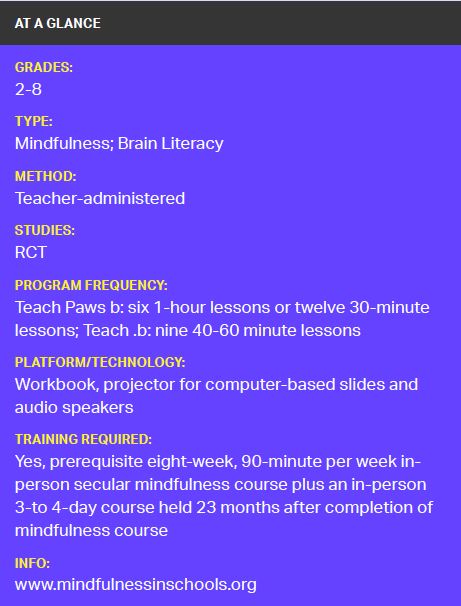 Founded in the UK in 2009 by schoolteachers and mindfulness practitioners Richard Burnett and Chris Cullen as a solution to the lack of classroom-based curricula to teach mindfulness, Mindfulness in Schools Project (MiSP) is a nonprofit committed to training educators on how to implement mindfulness in schools, and providing teachers with effective classroom-based mindfulness curriculum and resources. MiSP offers curricula for teachers, parents, and educators based on research in clinical psychology and neuroscience.
Founded in the UK in 2009 by schoolteachers and mindfulness practitioners Richard Burnett and Chris Cullen as a solution to the lack of classroom-based curricula to teach mindfulness, Mindfulness in Schools Project (MiSP) is a nonprofit committed to training educators on how to implement mindfulness in schools, and providing teachers with effective classroom-based mindfulness curriculum and resources. MiSP offers curricula for teachers, parents, and educators based on research in clinical psychology and neuroscience.
More than 450,000 primary and secondary students have used the MiSP programs, which are intended to help students manage anxieties and stressors associated with classroom learning, develop a greater emotional intelligence, promote prosocial habits while reducing conflictual and oppositional behaviors, and increase attention and self-regulation toward improved concentration. Studies have shown that students involved in a MiSP curriculum demonstrated increases in well-being, reduced stress, and lower rates of depression. Teachers reported improved EF skills in their students.
There are two school-based curriculums. Their acronymic program names point to key elements of mindfulness practice: “.b” means “stop and be” while “paws b” means “pause, breathe and be.” MiSP offers paws b for ages 7 to 11, and .b for ages 11 to 18. The curriculums are taught to students by trained teachers in their schools. Paws b covers 12 themes and is delivered in six 1-hour lessons or twelve 30-minute lessons. Topics include the brain, choices, attention, presence, mood awareness, steading attention, reactivity, deliberate responses, recognition of thought patterns, observation of thoughts, happiness, and appreciation. The .b curriculum is offered through 9 lessons that can vary in length for 40-60 minutes. Topics include mindfulness fundamentals, attention exploration, mind “taming” and kindness/curiosity cultivation, stress management, responsiveness vs. reactivity, mindful movement, perspective-gaining on thoughts, emotion management, gratitude development, and strategies for future practice. Teachers are encouraged to find natural connections between the MiSP curricular themes and school subject content.
A core tenet of the program requires educators to develop their own mindfulness practice by taking the MiSP “.begin” live online, 8-week introduction to mindfulness course or another recognized 8-week course (such as MBSR, MBCT, Breathworks, etc.), and maintaining a 2-3 month mindfulness practice prior to being eligible for the 3- or 4-day training that certifies the participant to teach MiSP curriculum in the classroom. An advanced training is also available for educators to become a School Mindfulness Lead. A worldwide network of trained MiSP teachers can join and access resources at “The Hub,” a portal with teacher resources, materials, teacher maps, logos, e-groups for mindfulness practice, online support, and an impact assessment tool.
The MiSP curriculum is flexible and can be used across school subjects or in a variety of educational or youth-related settings (such as sports clubs and young offender programs). The key effort is to promote building a daily mindfulness practice in order to make a positive difference in the mental health and well-being of young people and educators.
OVERVIEW: https://mindfulnessinschools.org
WEBINAR/VIDEO/DEMO: https://mindfulnessinschools.org/about/
CONTACT: https://mindfulnessinschools.org/contact/
KEY STUDIES SUMMARY:
In one study of 71 students ages 7 to 9, teacher assessment of EF increased. (Vickery, C. & Dorjee, D. (2016). Mindfulness Training in Primary Schools Decreases Negative Affect and Increases Meta- Cognition in Children. Frontiers in Psychology, 6. doi:10.3389/fpsyg.2015.02025.) https://www.ncbi.nlm.nih.gov/pmc/articles/PMC4709470/.
In another study, 522 students ages 12 to 16 who participated in MiSP showed an increase in well-being, reduced stress and lower rates of depression at a 3-month follow-up. (Kuyken, W., Weare, K. et al. (2013), Effectiveness of the Mindfulness in Schools Programme: non-randomised controlled feasibility study. The British Journal of Psychiatry, 203, 126–131. doi: 10.1192/bjp.bp.113.126649.) https://www.ncbi.nlm.nih.gov/pubmed/23787061
The .b programme is currently the basis for the large-scale MYRIAD study, a collaborative study funded by the Wellcome Trust, which involves an RCT involving 250 teachers and 8,000 students: http://oxfordmindfulness.org/news/mindfulness-resilience-adolescence-myriad-project/